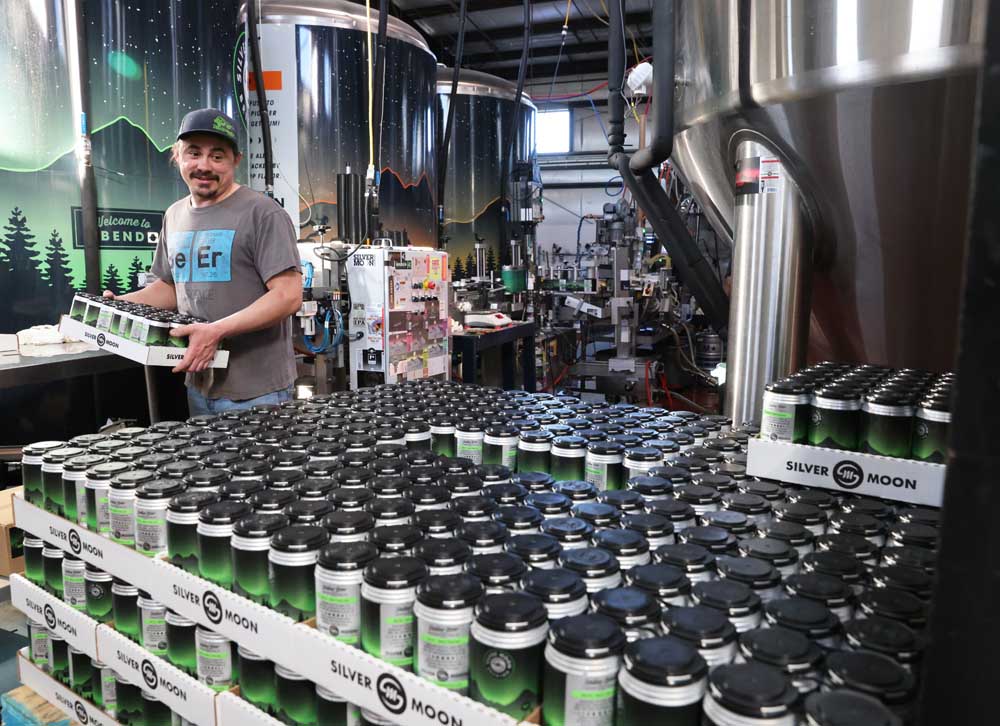As the cost of making craft beer increases, so does the cost to drinkers
Published 4:00 am Sunday, January 30, 2022

- Daniel Marsh, brewer and cellar man, stacks cases of beer on the canning line at the Silver Moon Brewing production facility in Redmond.
Consumers can expect to pay more for their favorite craft beer over the next few months, the result of the skyrocketing cost of transportation, paper and aluminum and a short supply of malt barley. Aluminum costs rose 5% this year and malt rose 10 cents a pound after a poor harvest caused limited supplies and shipping costs also increased.
Typically, craft beer prices have increased 2% to 3 % every year, but how much higher they’ll go this year is unknown and depends on how much the breweries are willing to absorb, said Bart Watson, chief economist for the Brewers Association, a Colorado-based association.
Trending
It means lower profit margins, though.
Brewers point to COVID-19 for causing the price ruckus, especially when it comes to workers. They’ve had to increase wages to lure workers, who are in short supply.
“Brewers are seeing much higher than normal increases in costs,” Watson said. “They’ll either have to accept a reduced margin or pass some of those costs on to consumers.”
In Central Oregon, beer sales are of particular interest because of the 30-plus breweries spread out over the three counties. But breweries are taking steps to halt the escalation. In Oregon alone there were 312 craft brewers in 2020, according to the Brewers Association.
Craft brewing contributed $62.1 billion to the country’s economy as the beer moves from breweries, wholesalers to retailers. In Oregon the economic impact measured $1.6 billion, according to the Brewers Association.
Stocking up
Trending
Worthy Brewing, where the cost of making beer has soared in the last three months, has purchased a year’s supply of malt at a price that was locked in before the harvest.
Silver Moon Brewing, also in Bend, purchased a year’s supply of cans and has them stored in their Redmond facility to lock in at a lower rate.
And Crux Fermentation Project canceled their order with a foreign suppler of cans and sought out a domestic provider at a higher price per can, but at lower shipping costs.
Even if breweries don’t raise their prices, what the consumer ultimately pays depends on the distributor and retailer, said Cody Banner, Worthy Brewing CEO. Some brewers, like Worthy, have opted to not change their price to the distributor.
Others have passed along the rising costs.
“We have not taken to passing on the rising costs to our consumers on the distribution side,” Banner said. “Our distributors, who sell our product, are selling it for a higher price. We don’t increase our prices to them.”
To combat rising costs brewers have taken different paths. One of the key aluminum can distributors in Washington and Oregon announced that in addition to raising prices for contract clients, it would set a minimum of five truck loads per order, said Christina LaRue, Oregon Brewers Guild executive director.
Finding cans that are affordable has been a journey for breweries, particularly during the pandemic, when keg sales were in declining as restaurants and bars required less product while being shuttered by government mandates early in the pandemic.
In terms of overall sales, Watson estimated that craft breweries fared better in 2021, compared to 2020, but will still be lower than before the pandemic. Exact figures won’t be released until early April, he said.
“The price of beer is up, so is a Big Mac. Even the merchandise we sell is up,” Banner said. “It’s happening to everyone, and everyone else is doing what they can to achieve their bottom line.”
Worthy has a 30-barrel system, which can produce as much as 40,000 barrels a year, but the brewery is currently producing a quarter of that, said Dustin Kellner, Worthy brewmaster. In 2016, the brewery produced 15,000 barrels, he said.
“Beer is all about manufacturing and manufacturing requires a steady supply chain,” said James Watts, Silver Moon co-owner. “Owning a brewery has become a multi-dimensional business. It’s more than increasing our own volume, but also bingo, trivia, comedy and live music. “
Silver Moon also rents out space to startup breweries who contract to use the equipment. That helps to offset rising fixed costs by making use of the equipment to other brewers, Watts said.
At Crux, which is located in an old transmission shop in Bend, the company projection was for a 5.9% increase in costs, but in actuality it was 7% in 2021, said Larry Sidor, founder and brewmaster. He called it a bitter pill.
“We’re working harder and making less money,” Sidor said. “It’s tough running a business right now.”








